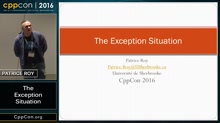CppCon 2016: The Exception Situation--Patrice Roy
 Have you registered for CppCon 2017 in September? Don’t delay – Registration is open now.
Have you registered for CppCon 2017 in September? Don’t delay – Registration is open now.
While we wait for this year’s event, we’re featuring videos of some of the 100+ talks from CppCon 2016 for you to enjoy. Here is today’s feature:
The Exception Situation
by Patrice Roy
Summary of the talk:
Exceptions have been a part of C++ for a long time now, and they are not going away. They allow programmers to concentrate on the meaningful parts of their code and treat the things that happen infrequently as… well, exceptional situations, to be dealt with when and where the context makes it reasonable or useful.
On the other hand, some significant parts of the C++ programming community either dislike this mechanism or outright reject it, for a number of reasons. Work in SG14 has raised performance issues in some cases; there are those who dislike the additional execution paths introduced in programs that rely on exceptions; some programmers raised issues with respect to exceptions and tooling, integration with older codebases, writing robust generic code, etc.
This talk will be neither for not against exceptions. It will present a perspective on cases where they make sense, cases where they are less appropriate, alternative disappointment handling techniques presented along with client code in order to show how the various approaches influence the way code is written. Performance measurements will be given along the way. Some creative uses of exceptions will also be presented in order to spark ideas and discussions in the room.

 Have you registered for CppCon 2017 in September?
Have you registered for CppCon 2017 in September?